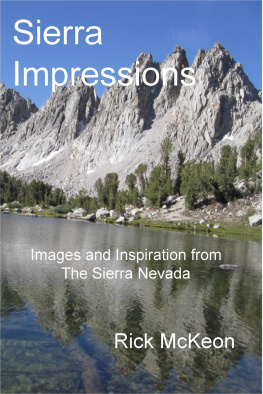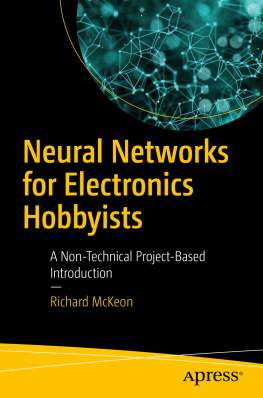On KnowingThe Natural Sciences
RICHARD MCKEON
Compiled by David B. Owen
Edited by David B. Owen and Zahava K. McKeon
THE UNIVERSITY OF CHICAGO PRESS
CHICAGO AND LONDON
Richard McKeon (190085) taught at the University of Chicago from 1935 until his retirement in 1974. He was the author of numerous books and articles. A selection of the articles is available in Freedom and History and Other Essays (1990), also published by the University of Chicago Press. McKeon served as an American representative to UNESCO and participated in the Committee on the Theoretical Bases of Human Rights, which helped prepare for the adoption of the Universal Declaration of Human Rights by the United Nations.
The University of Chicago Press, Chicago 60637
The University of Chicago Press, Ltd., London
1994 by The University of Chicago
All rights reserved. Published 1994
Printed in the United States of America
03 02 01 00 99 98 97 96 95 94 1 2 3 4 5
ISBN: 0-226-56026-0 (cloth)
ISBN: 0-226-56027-9 (paper)
ISBN: 978-0-226-40983-2 (ebook)
Library of Congress Cataloging-in-Publication Data
McKeon, Richard Peter. 1900
On knowingthe natural sciences / by Richard McKeon ; compiled by David B. Owen : edited by David B. Owen and Zahava K. McKeon.
p. cm.
Includes bibliographical references and index.
1. SciencePhilosophyHistory. 2. ScienceMethodologyHistory. I. Owen, David B., 1942 . II. McKeon, Zahava Karl. III. Title.
Q174.8.M38 1994
501dc20
94-8953
CIP
 The paper used in this publication meets the minimum requirements of the American National Standard for Information SciencesPermanence of Paper for Printed Library Materials, ANSI Z39.48-1984.
The paper used in this publication meets the minimum requirements of the American National Standard for Information SciencesPermanence of Paper for Printed Library Materials, ANSI Z39.48-1984.
To Marcelle Vennema Owen for unstinting support
CONTENTS
FIGURES AND TABLES
Figures
Tables
FOREWORD
When teaching introductory courses at the University of Chicago, Richard McKeon would often comment that any problem pushed far enough is philosophic. His point was that philosophizing is not just the technical province of academic professionals but an important aspect of all thoughtful undertakings, whether or not it is recognized as such. The present volume explores the consequences of this idea in the disciplines of the natural sciences, with particular focus on physics. It is the first of a projected three volumes, the succeeding two of which will treat, respectively, the social sciences and the humanities. All three are based on courses McKeon taught. He was widely regarded as an extraordinary teacher, both in his lectures and in his exposition of texts during discussions, and these volumes will present a uniquely detailed record of his educational practice. Focusing on understanding recurring issues in the disciplines and fundamental assumptions present in arguments about those issues, each will provide an introduction to philosophy as McKeon conceived of it. Possibly most important, both individually and as a whole they will provide an introduction to McKeons philosophic and historical semantics. Previously appearing in only the briefest of sketches, this is the interpretive approach on which, in one form or another, he based his own philosophic inquiry. Moreover, it is the semantic schematism which for years his students and colleagues have found to be so powerful in making meaning of the complexity of intellectual arguments not only throughout the history of Western thought but also across the whole spectrum of intellectual inquiry. In short, these volumes will introduce to those who did not personally know him something of McKeons remarkable contribution to education and philosophy.
A few words about the provenance of the present volume are in order. On KnowingThe Natural Sciences grows out of the first of a series of three courses McKeon invented and taught at Chicago in the 1950s and 1960s. The other two courses, which all comprise the succeeding volumes, covered the social sciences and the humanities. McKeon developed this set of courses to ), the revised course was offered with the same title but listed as Ideas and Methods 211. This year was the last time McKeon taught the introductory natural sciences course, and it is this last version which is presented here.
The lectures and discussions herein are based on transcriptions of a collection of tape recordings made by an unknown individual or individuals in 1963. They have been in the possession of one of the editors, David Owen, since the late 1960s. Because the tapes were recorded informally on inexpensive equipment, they are generally of poor quality. Despite careful rerecording with a parametric equalizer and playback through a ten-band equalizer, the editors have had to interpolate individual words and phrases, especially those of students in the discussions, in the context of the development of an idea. Passages utterly unrecoverable by these methods have been eliminated from the text, omissions which are indicated in the notes.
The editing of both the lectures and the discussions has been greatly assisted by the extensive collection of notes kept by McKeon in preparation for his classes. A virtually full set of notes exists for each of the eight versions of the lectures for the natural sciences course. McKeon was obviously meticulous both in his preparations for class and in his preservation of the materials so generated, which he frequently recast for use in later, sometimes indirectly related, courses. An example of how fully developed his lecture notes were is the set prepared for .
The editing here has been further supported by a set of extensive notes kept by one of the students who took this course for credit, Douglas Mitchell. All the figures and tables that appear in his notes are included here. Additional figures and tables, based both on McKeons spoken remarks as well as on the lecture and discussion notes which he prepared for class, have been prepared. Any figures and tables that do not exist in Mitchells notebook have been so identified in the notes.
When taken together with the forthcoming works on the social sciences and the humanities, the lectures presented here form the definitive elaboration of McKeons schematism of philosophic semantics. The schematism itself was never published during his lifetime, though a typescript copy circulated among his students and colleagues at Chicago from the mid-1960s on. It finally appeared posthumously in Philosophic Semantics and Philosophic Inquiry in . A discussion of early forms of this schematism appears in George Kimball Plochmanns Richard McKeon: A Study (Chicago: University of Chicago, 1990). Those interested in seeing how McKeon used his semantic schematism in his published work should consult John F. Callahans extensive bibliography, Richard Peter McKeon (19001985), Journal of the History of Ideas 47, no. 4 (Oct.Dec. 1986), pp. 65362.
The discussions in the course are based on five classic texts from physics. At the beginning of the course, McKeon handed out to students mimeographed selections from Platos Timaeus and Aristotles Physics. The Timaeus selectionssections 27d37c, 57d59d, and 88c90dwere based on the translation by Benjamin Jowett for Oxford University Press that, beginning in 1871, went through numerous editions; but the text McKeon used included a number of substantive revisions, presumably ones he had made. The selections from Aristotles Physicsbook II, chapters 12; book III, chapters 13; and book V, chapters 13were taken directly and without alteration from the translation by R. P. Hardie and R. K. Gaye originally prepared for W. D. Rosss edition of all of Aristotles works for the Oxford University Press completed in 1931 and included by McKeon in his own 1941 Random House edition of











 The paper used in this publication meets the minimum requirements of the American National Standard for Information SciencesPermanence of Paper for Printed Library Materials, ANSI Z39.48-1984.
The paper used in this publication meets the minimum requirements of the American National Standard for Information SciencesPermanence of Paper for Printed Library Materials, ANSI Z39.48-1984.